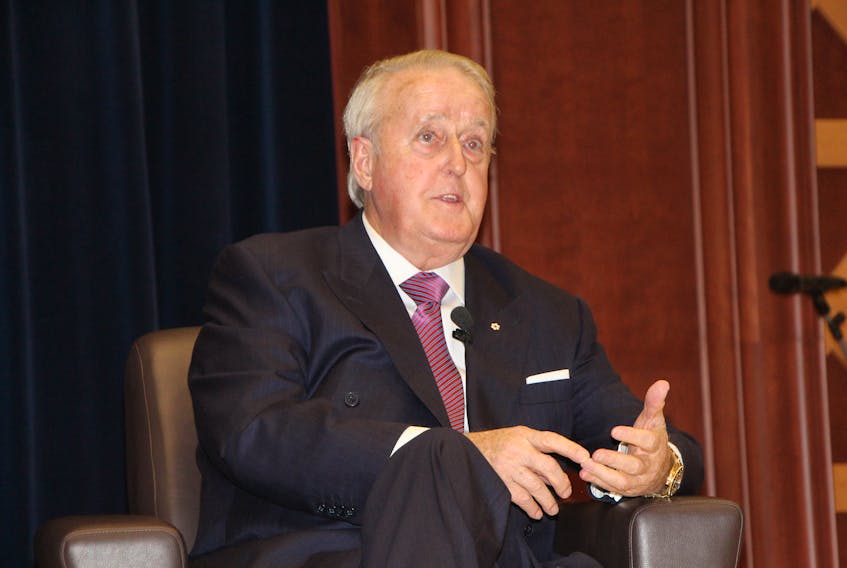The auditorium at the Gerald Schwartz School of Business at St. F.X. was near capacity with students, faculty and guests who participated in a conversation about the legacy and foreign policy achievements of former two-time Canadian prime minister Brian Mulroney.
Mulroney shared anecdotes about his past work as part of the official launch of a book on that subject: Master of Persuasion, Brian Mulroney’s Global Legacy.
Topics of discussion at the Oct. 25 book launch ranged from accounts of his close working relationships with past U.S. presidents and his government’s tax reform, to the foreign policy work he did to help free Nelson Mandela, under South Africa’s apartheid regime and his environmental achievements, like the Acid Rain Accord air quality agreement.
Mulroney reflected on a number of questions about his political legacy from the author of the book, Fen Osler Hampson and the audience.
“What I learned while writing the book is that Mr. Mulroney was a team player,” said author Fen Osler Hampson said, while introducing his book and the man it is about. “He built a team that had to get it done, and that requires real leadership… it’s about not winning popularity contests, but doing the right thing.”
South Africa
One person in the audience was so proud of Mulroney’s past achievements in South Africa, that she literally sang his praises. To honour the work Mulroney’s government did to pressure the apartheid government of South Africa to release Nelson Mandela from prison, Coady International Institute Social Justice Chair Sadi Motsuenyane, a native of South Africa, stood and sang a verse from the country’s national anthem – a gesture that resulted in the rest of the audience standing and applauding her.
“Thank you for what you have done for us, having contributed that much to the fall of apartheid. I think you have cherished the dream of Nelson Mandela,” Motsuenyane said.
“I regret that we have only met today, because if I were still prime minister I would recommend your attitude, singing so beautifully, be adopted in the House of Commons, before they get to ask you a question,” Mulroney quipped, to the merriment of the audience.
Mulroney said he decided to support Mandela, “because nobody else would. The Brits said no, the Americans said no, and I said yes on behalf of Canada.”
After seeing inaction on the part of previous governments, Mulroney said he resolved to campaign until Mandela’s release.
“The morning I got a call from the prime minister’s switch board in Ottawa, and they said, ‘there’s a man on the phone who says he’s Nelson Mandela,’ ” Mulroney said. “I said ’Yeah, that’s my friends from Baie Comeau trying to have fun at my expense.’”
The phone call, as it turned out, was Mandela personally calling Mulroney to thank him – one of many vivid memories Mulroney shared about his busy two terms as prime minister.
Motsuenyane asked Mulroney what sort of future he could see for South Africa, given the election of its new president, Cyril Ramaphossa, a politician she described as being a business man – an appellation also associated with Mulroney’s style of governance.
Mulroney said he “has great confidence in the future of South Africa,” but that there needs to be strong public policy and leaders who aren’t afraid to be unpopular.
“They have a strong president who has absolute control over the ANC, and has a strong majority in parliament. I think the line from the Old Testament could never be more true: young men have vision and old men have dreams. Great nations need a combination of both visions and dreams – and you’ve got them,” Mulroney said.
“You’ve got Mandela’s visions, and you’ve got the dreams of a younger generation.
Mulroney added that he believes Canada should play a stronger role in providing aid to South Africa, and that the country needs more foreign capital to create wealth that can be distributed to help create jobs and opportunities for black South Africans.
“I think Cyril can do that. He needs all the help he can get, starting with help from the States, which he’s not going to get right now. There’s where Canada can step back in”
Trade Agreements
Given that negotiations on a new trade agreement between Canada, the United States and Mexico has just been approved, and the fact that Mulroney played a role in negotiating both the North American Free Trade Agreement (NAFTA) and the agreement that came before it, the Canada-United States Free Trade Agreement (CUSFTA), a great deal of the discussion was devoted to that subject.
“I told Trudeau, ‘do you want to know how to deal successfully?’ I’ve known Trump for 25 years, our kids our friends. I told Justin, ‘keep your head down, keep your mouth shut, prepare, prepare, prepare and never, under any circumstances take the bait of one of Donald’s tweets,’” Mulroney said, adding that he advised Trudeau that time is on his side, and that if the deal offered wasn’t good, to walk away.
Mulroney said he believed Canada did well negotiating the Canada-Mexico-U.S. Trade Agreement, adding the Trudeau government “handled this in a mature and significant manner,” retaining most of what was achieved 30 years ago.
“They did take a hit in other areas. If you’re going to have a trilateral agreement, everyone’s got to win something and come out of it feeling good about it,” Mulroney noted. “Did we give up some things to get it? Sure, we did. The Americans gave up some things, and the Mexicans did as well. In some important areas, the deal is really well done for Canada.”
Mulroney also reflected on his own assertive negotiation tactics, in forming past trade agreements, recalling how he pushed for independent dispute resolution provisions, and would often take hard stances to achieve such measures.
Mulroney was asked by a guest if he saw problems with a new Mexican president-elect taking over the trade deal, since the new trade agreement was signed by outgoing president Enrique Peña Nieto.
“I don’t think there’s going to be any real change. Obrador sent delegates to join the negotiating team from Mexico. It was brought back and approved by both the president and Obrador,” Mulroney said.
Inspiration
A first-year student in the audience asked Mulroney who the U.S. presidents he admired the most are.
Mulroney said he has worked with four presidents; worked intimately with three and known many on a very good basis. He described Ronald Regan as a “remarkable leader,” underestimated, but also “one of the most powerful American leaders in the 20th century.”
Mulroney referred to George H.W. Bush as a “gentlemanly pro-Canadian president, and Bill Clinton as “the most gifted politician of his generation,” and “a delight to work with.” Mulroney also praised Richard Nixon, a president who is known for his impeachment, but was, by Mulroney’s description, someone who worked hard, coming from humble beginnings, with a solid record on environmental policy, a “foreign policy genius” and the president in whose term U.S. participation in the Vietnam war was ended.









